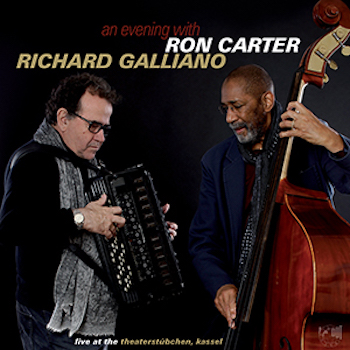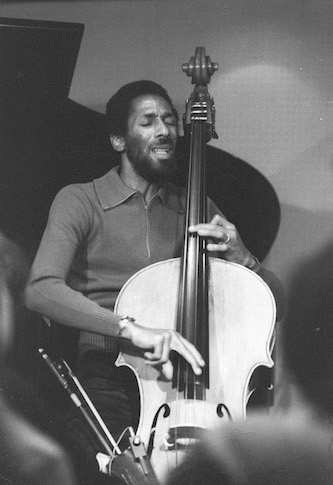Jazz Album Review: “An Evening with Ron Carter and Richard Galliano” — Delightful
By Michael Ullman
The clarity and focus of Ron Carter’s bass is exemplary here, as is the balance with Richard Galliano’s accordion.
An Evening with Ron Carter and Richard Galliano (In + OUT Records)
B orn in 1950 and brought up in Nice on the Riviera, the French accordionist Richard Galliano said he discovered and became entranced by jazz when he heard records by trumpeter Clifford Brown with the Clifford Brown-Max Roach Quintet. He was 14. He soon won various accordion competitions but was unsatisfied with his place in the musical world and that of his instrument, known colloquially as the poor man’s piano. “It was my dearest wish: to give a fair place to this instrument, unjustly qualified as the ‘poor man’s piano’ whereas my accordion has always been a Steinway with braces. I was determined to restore the image of my instrument, so I left my native village and went up to Paris.” He has made dozens of recordings since, including a group with Argentinian Astor Piazzolla, the creator of the “new tango,” and with jazz persons such as Chet Baker, Wynton Marsalis, Martial Solal, Michael Portal. He’s recorded with popular singer Charles Aznavour, as well as with jazz composer Michael Gibbs. He’s famous: there’s an asteroid named after him, and he’s the only accordionist signed to DGG.
orn in 1950 and brought up in Nice on the Riviera, the French accordionist Richard Galliano said he discovered and became entranced by jazz when he heard records by trumpeter Clifford Brown with the Clifford Brown-Max Roach Quintet. He was 14. He soon won various accordion competitions but was unsatisfied with his place in the musical world and that of his instrument, known colloquially as the poor man’s piano. “It was my dearest wish: to give a fair place to this instrument, unjustly qualified as the ‘poor man’s piano’ whereas my accordion has always been a Steinway with braces. I was determined to restore the image of my instrument, so I left my native village and went up to Paris.” He has made dozens of recordings since, including a group with Argentinian Astor Piazzolla, the creator of the “new tango,” and with jazz persons such as Chet Baker, Wynton Marsalis, Martial Solal, Michael Portal. He’s recorded with popular singer Charles Aznavour, as well as with jazz composer Michael Gibbs. He’s famous: there’s an asteroid named after him, and he’s the only accordionist signed to DGG.
He’s never lost what the title of one of his albums calls the French Touch: his pieces exude a gypsy flavor that reminds this listener of Django Reinhardt. Galliano and Ron Carter recorded in duet once before, on a 1991 album called Panamanhattan (Dreyfus). There they play Galliano pieces, the cheerfully bouncy Horace Silver tune “Summer in Central Park,” the standard “Portrait of Jennie,” and Carter’s “Doom,” “A Small Ballad,” and “Little Waltz.” The innocent reediness of Galliano’s statement of “Little Waltz”‘s theme is almost as appealing as Carter’s original recording.

Bassist Ron Carter. Photo: Michael Ullman
Their ”new” album, which I am listening to on vinyl, was made in 2016. It’s even better than Panamanhattan. For one thing, it is better recorded. The clarity and focus of Ron Carter’s bass is exemplary, as is the balance with the accordion. The duo is more relaxed with each other, which means there’s more daring in their improvisations. And more amusement. When reprising Carter’s delightful melody “Einbahnstrasse,” the two exchange phrases in traditional fashion. Then Galliano plays his part in a high squeak and that seems to surprise Carter, as does the low grumble Galliano emits next. In response, Carter heads up to the altissimo range as if to show he is in on the joke. Galliano’s playing on his “Tango for Claude” is full bodied, but he leaves plenty of room for Carter to dance all around him. Later, they seem to intuit one another’s other’s parts as they play for four bars and do so in near unison. Galliano slows the tempo unexpectedly and comes up with chords whose squareness Carter imitates. Then the accordionist starts playing in something like double time. It was an unexpected move. They seem to delight in following each other’s lead.
Each musician has a solo number. Carter’s is the state song of Louisiana, “You Are My Sunshine.” (A few people might remember, as I do, Gene Autry’s version.) Carter becomes almost raucous at times in this piece of Americana: in one chorus he quotes Bach before returning to a beautifully elaborated version of the familiar tune. Galliano’s feature is his own “Aria” joined at the hip to Astor Piazzolla’s “Libertango,” the Argentinian’s zestful declaration of freedom from the “old” tango. It’s a virtuoso display of accordion playing. The duo gets together again for a Carter tune, “Blues for D. P.” (Perhaps D.P. is pianist Don Pullen, who died the previous year.) Carter’s at his best here, or one of his bests, since he seems able to do anything. Galliano somehow bends pitches, holds onto dissonant chords and, when he wants, huffs and puffs during his solo. Throughout he supports Carter respectfully. The LP finishes with another Carter piece, “Ah, Rio.”
Michael Ullman studied classical clarinet and was educated at Harvard, from which he received a PhD in English. The author or co-author of two books on jazz, he has written on jazz and classical music for the Atlantic Monthly, New Republic, High Fidelity, Stereophile, Boston Phoenix, Boston Globe, and other venues. His articles on Dickens, Joyce, Kipling, and others have appeared in academic journals. For over 20 years, he has written a bi-monthly jazz column for Fanfare Magazine, for which he also reviews classical music. At Tufts University, he teaches mostly modernist writers in the English Department and jazz and blues history in the Music Department. He plays piano badly.
